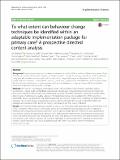Files in this item
To what extent can behaviour change techniques be identified within an adaptable implementation package for primary care? A prospective directed content analysis
Item metadata
| dc.contributor.author | ASPIRE programme team | |
| dc.date.accessioned | 2019-03-01T15:30:21Z | |
| dc.date.available | 2019-03-01T15:30:21Z | |
| dc.date.issued | 2018-02-17 | |
| dc.identifier | 257964658 | |
| dc.identifier | c7aaf3d9-437d-4d81-910e-5d48cefc7166 | |
| dc.identifier | 85042063164 | |
| dc.identifier | 29452582 | |
| dc.identifier.citation | ASPIRE programme team 2018 , ' To what extent can behaviour change techniques be identified within an adaptable implementation package for primary care? A prospective directed content analysis ' , Implementation Science , vol. 13 , no. 1 , 32 . https://doi.org/10.1186/s13012-017-0704-7 | en |
| dc.identifier.issn | 1748-5908 | |
| dc.identifier.other | ORCID: /0000-0001-8684-0403/work/64361447 | |
| dc.identifier.uri | https://hdl.handle.net/10023/17194 | |
| dc.description.abstract | Background: Interpreting evaluations of complex interventions can be difficult without sufficient description of key intervention content. We aimed to develop an implementation package for primary care which could be delivered using typically available resources and could be adapted to target determinants of behaviour for each of four quality indicators: diabetes control, blood pressure control, anticoagulation for atrial fibrillation and risky prescribing. We describe the development and prospective verification of behaviour change techniques (BCTs) embedded within the adaptable implementation packages. Methods: We used an over-lapping multi-staged process. We identified evidence-based, candidate delivery mechanisms-mainly audit and feedback, educational outreach and computerised prompts and reminders. We drew upon interviews with primary care professionals using the Theoretical Domains Framework to explore likely determinants of adherence to quality indicators. We linked determinants to candidate BCTs. With input from stakeholder panels, we prioritised likely determinants and intervention content prior to piloting the implementation packages. Our content analysis assessed the extent to which embedded BCTs could be identified within the packages and compared them across the delivery mechanisms and four quality indicators. Results: Each implementation package included at least 27 out of 30 potentially applicable BCTs representing 15 of 16 BCT categories. Whilst 23 BCTs were shared across all four implementation packages (e.g. BCTs relating to feedback and comparing behaviour), some BCTs were unique to certain delivery mechanisms (e.g. 'graded tasks' and 'problem solving' for educational outreach). BCTs addressing the determinants 'environmental context' and 'social and professional roles' (e.g. 'restructuring the social and 'physical environment' and 'adding objects to the environment') were indicator specific. We found it challenging to operationalise BCTs targeting 'environmental context', 'social influences' and 'social and professional roles' within our chosen delivery mechanisms. Conclusion: We have demonstrated a transparent process for selecting, operationalising and verifying the BCT content in implementation packages adapted to target four quality indicators in primary care. There was considerable overlap in BCTs identified across the four indicators suggesting core BCTs can be embedded and verified within delivery mechanisms commonly available to primary care. Whilst feedback reports can include a wide range of BCTs, computerised prompts can deliver BCTs at the time of decision making, and educational outreach can allow for flexibility and individual tailoring in delivery. | |
| dc.format.extent | 1005256 | |
| dc.language.iso | eng | |
| dc.relation.ispartof | Implementation Science | en |
| dc.rights | This article is distributed under the terms of the Creative Commons Attribution 4.0 International License (http://creativecommons.org/licenses/by/4.0/), which permits unrestricted use, distribution, and reproduction in any medium, provided you give appropriate credit to the original author(s) and the source, provide a link to the Creative Commons license, and indicate if changes were made. | en |
| dc.subject | Audit and feedback | en |
| dc.subject | Behaviour change techniques | en |
| dc.subject | Clinical reminders | en |
| dc.subject | Computerised prompts | en |
| dc.subject | Discriminant content analysis | en |
| dc.subject | Educational outreach | en |
| dc.subject | Implementation intervention | en |
| dc.subject | Theoretical Domains Framework | en |
| dc.subject | RA Public aspects of medicine | en |
| dc.subject | Health Policy | en |
| dc.subject | Health Informatics | en |
| dc.subject | Public Health, Environmental and Occupational Health | en |
| dc.subject | T-NDAS | en |
| dc.subject | SDG 3 - Good Health and Well-being | en |
| dc.subject.lcc | RA | en |
| dc.title | To what extent can behaviour change techniques be identified within an adaptable implementation package for primary care? A prospective directed content analysis | en |
| dc.type | Journal article | en |
| dc.contributor.institution | University of St Andrews.School of Management | en |
| dc.identifier.doi | 10.1186/s13012-017-0704-7 | |
| dc.description.status | Peer reviewed | en |
| dc.identifier.url | http://www.scopus.com/inward/record.url?scp=85042063164&partnerID=8YFLogxK | en |
This item appears in the following Collection(s)
Items in the St Andrews Research Repository are protected by copyright, with all rights reserved, unless otherwise indicated.

